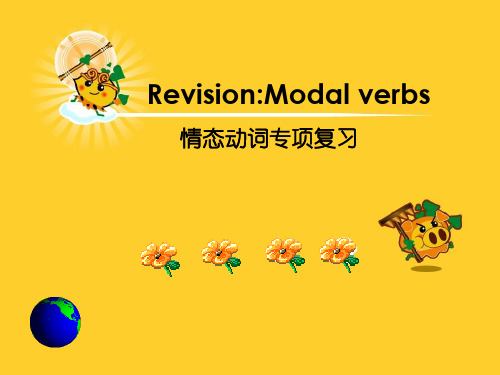情态动词课件 黄淑萍
合集下载
情态动词(20张PPT)初中英语专项复习课件

看法。
(1)只作情态动词:must;can/could;may/might;ought to
(2)既可作情态动词又可作实义动词:need,dare
((34))既 具可 有作 情情 态态 动动词词某又些可特作征稿稿定助:定hPa动PPvTP,e词T/海h:量asd素ha材tlo持l;/s续hha更odublde;twteirll/would
【知识拓展】
1. must的一般疑问句,肯定回答为Yes, ...must.;否定回答为No, ...needn’t./No, ...don’t have
to.—Must I clean the classroom now? 我必须现在打扫教室吗?
—Yes, you must. 是的,你必须。/No, you don’t have to. /No, you needn’t. 不,你不必。
He promised he would never smoke again. 他承诺他再也不吸烟了。
Their English teacher would tell them stories in
表示过去反复发生的动 English after class.
作或某种倾向
他们的英语老师总是在课后用英语给他们讲故事
新,上千款模板选择总有一
款适合你
知识点二:情态动词的特点
情态动词的特点: (1)情态动词无人称和数的变化(have to除外); (2)情态动词后接动词原形; (3)情态动词的否定式是在其后加not; have to除外 (4)具有助动词的作用,可用来构成否定句、疑问句及用于简明答语; (5)个别情态动词有现在式和稿过定去PP式T两种形式,过去式用来表达更加客气、委 婉的语气,时态性不强,可稿用定于PPT过,海去量、素材现持在续更或将来。
(1)只作情态动词:must;can/could;may/might;ought to
(2)既可作情态动词又可作实义动词:need,dare
((34))既 具可 有作 情情 态态 动动词词某又些可特作征稿稿定助:定hPa动PPvTP,e词T/海h:量asd素ha材tlo持l;/s续hha更odublde;twteirll/would
【知识拓展】
1. must的一般疑问句,肯定回答为Yes, ...must.;否定回答为No, ...needn’t./No, ...don’t have
to.—Must I clean the classroom now? 我必须现在打扫教室吗?
—Yes, you must. 是的,你必须。/No, you don’t have to. /No, you needn’t. 不,你不必。
He promised he would never smoke again. 他承诺他再也不吸烟了。
Their English teacher would tell them stories in
表示过去反复发生的动 English after class.
作或某种倾向
他们的英语老师总是在课后用英语给他们讲故事
新,上千款模板选择总有一
款适合你
知识点二:情态动词的特点
情态动词的特点: (1)情态动词无人称和数的变化(have to除外); (2)情态动词后接动词原形; (3)情态动词的否定式是在其后加not; have to除外 (4)具有助动词的作用,可用来构成否定句、疑问句及用于简明答语; (5)个别情态动词有现在式和稿过定去PP式T两种形式,过去式用来表达更加客气、委 婉的语气,时态性不强,可稿用定于PPT过,海去量、素材现持在续更或将来。
情态动词讲解精ppt课件

例句
will/would
详细描述:will 表示现在的意愿或 预测,would 表示过去的或虚拟 的意愿或预测。
1. I will help you with your project.(我会帮助你完成你的项 目。)
总结词:表示意愿或预测
例句
2. They would have gone to the party if they had known about it earlier.(如果他们早点 知道,他们就会去参加聚会。)
表示意愿
情态动词+动词原形,如 would like to go,表示 某人想要去。
形式变化
基本形式
情态动词的基本形式包括 现在时、过去时和将来时 。
过去式
情态动词的过去式通常是 在基本形式后面加-d或ed,如could have done 、should have done等。
将来时
情态动词的将来时通常是 在基本形式后面加-will或shall,如will be able to 、shall have to等。
may与might的区别与联系
总结词
may表示现在的许可或可能性;might表示过去的可能性或许可。
详细描述
may用于肯定句中,表示许可或可能性,例如“You may use this room.”(你可以使用这个房间。 )“The book may be in the library.”(这本书可能在图书馆里。)might表示过去的可能性,常 用于过去时态的句子中,例如“He might come tomorrow.”(他明天可能来。)
未必、很难说
She might not agree with us.
表示虚拟语气
will/would
详细描述:will 表示现在的意愿或 预测,would 表示过去的或虚拟 的意愿或预测。
1. I will help you with your project.(我会帮助你完成你的项 目。)
总结词:表示意愿或预测
例句
2. They would have gone to the party if they had known about it earlier.(如果他们早点 知道,他们就会去参加聚会。)
表示意愿
情态动词+动词原形,如 would like to go,表示 某人想要去。
形式变化
基本形式
情态动词的基本形式包括 现在时、过去时和将来时 。
过去式
情态动词的过去式通常是 在基本形式后面加-d或ed,如could have done 、should have done等。
将来时
情态动词的将来时通常是 在基本形式后面加-will或shall,如will be able to 、shall have to等。
may与might的区别与联系
总结词
may表示现在的许可或可能性;might表示过去的可能性或许可。
详细描述
may用于肯定句中,表示许可或可能性,例如“You may use this room.”(你可以使用这个房间。 )“The book may be in the library.”(这本书可能在图书馆里。)might表示过去的可能性,常 用于过去时态的句子中,例如“He might come tomorrow.”(他明天可能来。)
未必、很难说
She might not agree with us.
表示虚拟语气
《情态动词》PPT课件

work our this problem. 如果你睡个好觉,那么你就能做出这个题目。 3、表示过去的能力: could表示过去一般的能力, 但不表示做或未做某事;
was/ were able to表示过去有能力并且成功地做了某事, 相当于managed to do something/ succeeded in doing something;
• Mr. Bush is on time for everything. How can it be that he was late for the opening ceremony? (表疑惑、惊讶)
表示请求、允许、允诺
1. 当对方是决策者时,你代表你(们)自己(I, We),或代表第三者(he,she,they)向对方 (you)请示或提出建议时用:
Revision:Modal verbs
情态动词专项复习
How many modal verbs
do you remember?
(情态动词)
一,常见的情态动词有:can, could, may, might ,must, shall, should, will, would, need, have to等
4、具有情态动词的某些特征的有:have(had) to, used to.
情态动词的特征
1、有一定的词义,但不能单独作谓语,它们要和行 为动词或连系动词连用,构成谓语。
2、适用于主语的各种人称和数 have to例外,主语 是第三人称单数时,要用has to)。如:
We/ He must work hard. 我们/他一定要努力工作。 I have to walk home. 我得步行回家。 He has to walk home. 他得步行回家。
was/ were able to表示过去有能力并且成功地做了某事, 相当于managed to do something/ succeeded in doing something;
• Mr. Bush is on time for everything. How can it be that he was late for the opening ceremony? (表疑惑、惊讶)
表示请求、允许、允诺
1. 当对方是决策者时,你代表你(们)自己(I, We),或代表第三者(he,she,they)向对方 (you)请示或提出建议时用:
Revision:Modal verbs
情态动词专项复习
How many modal verbs
do you remember?
(情态动词)
一,常见的情态动词有:can, could, may, might ,must, shall, should, will, would, need, have to等
4、具有情态动词的某些特征的有:have(had) to, used to.
情态动词的特征
1、有一定的词义,但不能单独作谓语,它们要和行 为动词或连系动词连用,构成谓语。
2、适用于主语的各种人称和数 have to例外,主语 是第三人称单数时,要用has to)。如:
We/ He must work hard. 我们/他一定要努力工作。 I have to walk home. 我得步行回家。 He has to walk home. 他得步行回家。
情态动词(17张PPT)初中英语专项复习课件

情态动词表推测也是每年中考的重点,以考查can’t 和must为主,主要在单项选择中考查不同情态动词的辨 析。考生在解答此类试题时,可以从以下几方面着手: ①表示否定的推测:一是断然的否定,此类题一般是考 查情态动词表推测的用法,语境会对所填空给出解释, 据 此 可 以 判 断 是 非 常 肯 定 的 否 定 , 此 时 最 好 用 cannot /can’t;二是表示不能十分肯定或拿不准,此类题一般 也会有相关的语境提示,如I’m not sure、who knows等 ,此时最好用may或might。
表示需要、必须,主 要用于否定句和疑问 句中。needn’t常用 于回答must表请求的 否定回答
—Must I finish my homework now?我必 须现在完成我的家庭作 业吗? —No, you needn’t. 不, 你不需要。
注意 (1) must和have/has to均意为“必须”,常可互 换使用。但have/has to是用于强调客观需要,意为 “必须, 不得不”;must用于表示主观看法, 意为“ 必须, 应该”。如:We’ll have to ask Zhang Hong. 我们必须去问张红了。 We must work hard at school. 在学校我们必须 努力学习。
情态动词本身有一定的意义,但不能独立作谓语, 没有人称和数的变化,后面必须接动词原形。常见的情 态动词有:may, must, need, have to 等,具体用法见下表 :
情态动词
用法
例句
表示能力,意为 Sam can speak English well.
can “能,会”
山姆英语讲得很好。
He could have gone home. 他可能已回家了。
表示需要、必须,主 要用于否定句和疑问 句中。needn’t常用 于回答must表请求的 否定回答
—Must I finish my homework now?我必 须现在完成我的家庭作 业吗? —No, you needn’t. 不, 你不需要。
注意 (1) must和have/has to均意为“必须”,常可互 换使用。但have/has to是用于强调客观需要,意为 “必须, 不得不”;must用于表示主观看法, 意为“ 必须, 应该”。如:We’ll have to ask Zhang Hong. 我们必须去问张红了。 We must work hard at school. 在学校我们必须 努力学习。
情态动词本身有一定的意义,但不能独立作谓语, 没有人称和数的变化,后面必须接动词原形。常见的情 态动词有:may, must, need, have to 等,具体用法见下表 :
情态动词
用法
例句
表示能力,意为 Sam can speak English well.
can “能,会”
山姆英语讲得很好。
He could have gone home. 他可能已回家了。
情态动词语法 ppt课件

ppt课件 3
(3) 表示客观可能性即推测用法,多用于否定句和疑问句中, could只表示可能性比can小,不表时态。(否定推测) —Who is that man? Can it be your uncle? —No, it can’t be him. (4) can 也用在肯定陈述句中,表示理论上的可能性,意为“有 时可能会” Anybody can make mistakes. Even top students can make mistakes in the exam. 即使优秀学生在考试中也可能会出错。
ppt课件
14
(3)shall用在主语是第三人称的陈述句中,表示条约,规章,法令 等文件中表示义务或规定, 常用于官方文件中,表明具有法律效 力。(而should表示应该,义务)。 All payments shall be paid by the end of the month. 本月底所有款项必须付清。 No person shall carry a mobil phone into the examination room during the College Extrance Examination.
ppt课件 7
(2)may和might的用法
1. may和might表示请求、许可。 表示征求同意和允许,表征求同意时,might比may的语气更委 婉一些,否定回答时要用mustn’t表示“不可以”、“禁止”、“阻止” 之意。 may表示“允许”,否定形式为mustn't/can't,表示“禁止、不允 许、不可以”如: You may keep the book for a week. 这本书你可以保留一星期。 — Might I use your pen? — Yes, you may/can. —No, you mustn't/can't.
(3) 表示客观可能性即推测用法,多用于否定句和疑问句中, could只表示可能性比can小,不表时态。(否定推测) —Who is that man? Can it be your uncle? —No, it can’t be him. (4) can 也用在肯定陈述句中,表示理论上的可能性,意为“有 时可能会” Anybody can make mistakes. Even top students can make mistakes in the exam. 即使优秀学生在考试中也可能会出错。
ppt课件
14
(3)shall用在主语是第三人称的陈述句中,表示条约,规章,法令 等文件中表示义务或规定, 常用于官方文件中,表明具有法律效 力。(而should表示应该,义务)。 All payments shall be paid by the end of the month. 本月底所有款项必须付清。 No person shall carry a mobil phone into the examination room during the College Extrance Examination.
ppt课件 7
(2)may和might的用法
1. may和might表示请求、许可。 表示征求同意和允许,表征求同意时,might比may的语气更委 婉一些,否定回答时要用mustn’t表示“不可以”、“禁止”、“阻止” 之意。 may表示“允许”,否定形式为mustn't/can't,表示“禁止、不允 许、不可以”如: You may keep the book for a week. 这本书你可以保留一星期。 — Might I use your pen? — Yes, you may/can. —No, you mustn't/can't.
情态动词讲解ppt课件

1.Can this be an excuse for not giving them help? 表示惊异、怀疑、不相信 2.This can’t be true. 等态度,主要用在否定句、 3.How can you be so crazy. 疑问句和感叹句中。
考评项目赋标准分,对照考评内容和 考评办 法对考 评项目 进行考 评,评 出各考 评项目 的考评 实际得 分,考 评类目 下各考 评项目 考评实 际得分 之和为 该考评 类目的 考评实 际得分
2.表示推测时,could不是过去式,只是语气更委婉;若是推测已发生的事或过去的情况,用can/could have done
3.can和be able to辨析 can(could)和be able to都可以表示能力,意思上没有区别。但can只有现在式和过去式,而be able to则 有更多的形式。如:
考评项目赋标准分,对照考评内容和 考评办 法对考 评项目 进行考 评,评 出各考 评项目 的考评 实际得 分,考 评类目 下各考 评项目 考评实 际得分 之和为 该考评 类目的 考评实 际得分
语法 :情态动词
---Modal Verbs
考评项目赋标准分,对照考评内项目 的考评 实际得 分,考 评类目 下各考 评项目 考评实 际得分 之和为 该考评 类目的 考评实 际得分
After the accident it was a long time before she was able to walk again. The fire was very big, but most people were able to escape from the building.
I’ve always wanted to be able to speak fluent English. Those bags look really heavy, are you sure you’ll be able to carry them on your own?
《情态动词讲解》课件

1
表示能力和可能性
这一用法涉及到情态动词在表示一个
表示推测和推断
2
人或事物的能力或可能性方面的应用。
情态动词还可用来表示具有推测性质
的情况和推断。
3
表示义务和建议
情态动词可用于表示某人应该或必须
表示意愿和打算
4
做的事情,或者提出建议。
用情态动词来表达某人的意愿或打算 进行的行为。
情态动词的否定和疑问
3 同时使用情态动词和实义动词时的注意事项
了解使用情态动词和实义动词时需要注意的细节。
总结
情态动词的重要性
深入理解情态动词的重要性,以及它们在语言中 的作用。
情态动词的学习方法
提供一些有效的学习方法,帮助您更好地掌握情 态动词的用法。
参考资料
书籍推荐
推荐一些深入学习情态动词的相关书籍。
网站推荐
建议一些在线资源,以便进一步学习和练习 情态动词。
2 may/might
表示推测和推断的情态 动词。
3 shall/should
表示义务和建议的情态 动词。
4 will/would
表示意愿和打算的情态动词。
5 must
表示必须和必然的情态动词。
情态动词的用法
情态动词有多种用法,我们将详细讨论其中的一些,包括表示能力和可能性、推测和推断、义务和建 议,以及意愿和打算。
特点
情态动词具有几个典型的特点,例如它们没有人称和数的变化,并且后面跟原形动词。
情态动词的种类
情态动词有几种常见的类型,我们将深入讨论其中的几个种类,包括can/could、may/might、 shall/should、will/would以及must。
1 can/could
情态动词全部ppt课件

A.must
B.would
C.should
D.might
19
• 翻译 • ----我能在这个房间抽烟吗? .
---- 可以。 ---- 不行,… ----Might/ May I smoke in this room?
---- Yes, you can.
---- No, you mustn’t
20
rule.
(威胁)
26
Shall 决心、承诺、警告、命令 you \he\she\they shall…..(二三人称陈述)
When the chairman turns up, nobody shall say a word. 命令 Students shall remain in their seats until the papers have been
28
5. should
1. should表示义务、职责、劝告,意 为 “应该”。
eg: You should keep your promise. Students should respect teachers.
29
2)表示说话人_惊_讶______等特殊情感。
It’s surprising that Mary should not know Lei Feng.
3.must, need没有时态,但有些情态动词如can、 may,will,have to有一般式和过去式的变化。
4. 情态动词不能单独做谓语,必须和实义动词原形 一起构成谓语。
3
情态动词的“时态”形式并不是时间区 别的 主要标志, 不少情况下, 情态动词的 现在式 形式和过去式形式都可用来表 示现在时 间、过去时间和将来时间。
英语八年级情态动词ppt课件

③have to的否定形式是don’t have to, 相当于needn’t, 意为“不必”;mustn’t 表示“禁止,不允许”.
认识到了贫困户贫困的根本原因,才 能开始 对症下 药,然 后药到 病除。 近年来 国家对 扶贫工 作高度 重视, 已经展 开了“ 精准扶 贫”项 目
(5) can’t 和 mustn’t 表否定推测时应用can’t, mustn’t 意为“禁止,不允许”, 不用来表推测,在肯定句中用must表推测,意为“一定”
认识到了贫困户贫困的根本原因,才 能开始 对症下 药,然 后药到 病除。 近年来 国家对 扶贫工 作高度 重视, 已经展 开了“ 精准扶 贫”项 目
二、情态动词的用法
1. Can的 用法
⑴ 常用来表示能力,意为“能,会”。 eg:She can swim fast, but I can’t.
⑵表示请求或许可,意为“可以”。 eg: Can you go shopping with us?
D. wouldn’t
认识到了贫困户贫困的根本原因,才 能开始 对症下 药,然 后药到 病除。 近年来 国家对 扶贫工 作高度 重视, 已经展 开了“ 精准扶 贫”项 目
4) can’t 可用来作May I ….?的否定回答 ----May I go surfing alone this afternoon? ----No, you can’t . It’s dangerous. 5) can和 be able to 两者都是表示“能力”是用法相同,但can只有原形和 过去式could两种形式,其他时态要用be able to来表 示。另外,be able to常常有“成功做了某事”的意味 Jim can’t speak English. We were able to reach the top of the maintain at noon.
认识到了贫困户贫困的根本原因,才 能开始 对症下 药,然 后药到 病除。 近年来 国家对 扶贫工 作高度 重视, 已经展 开了“ 精准扶 贫”项 目
(5) can’t 和 mustn’t 表否定推测时应用can’t, mustn’t 意为“禁止,不允许”, 不用来表推测,在肯定句中用must表推测,意为“一定”
认识到了贫困户贫困的根本原因,才 能开始 对症下 药,然 后药到 病除。 近年来 国家对 扶贫工 作高度 重视, 已经展 开了“ 精准扶 贫”项 目
二、情态动词的用法
1. Can的 用法
⑴ 常用来表示能力,意为“能,会”。 eg:She can swim fast, but I can’t.
⑵表示请求或许可,意为“可以”。 eg: Can you go shopping with us?
D. wouldn’t
认识到了贫困户贫困的根本原因,才 能开始 对症下 药,然 后药到 病除。 近年来 国家对 扶贫工 作高度 重视, 已经展 开了“ 精准扶 贫”项 目
4) can’t 可用来作May I ….?的否定回答 ----May I go surfing alone this afternoon? ----No, you can’t . It’s dangerous. 5) can和 be able to 两者都是表示“能力”是用法相同,但can只有原形和 过去式could两种形式,其他时态要用be able to来表 示。另外,be able to常常有“成功做了某事”的意味 Jim can’t speak English. We were able to reach the top of the maintain at noon.
情态动词(共43张PPT)

A.Must; mustn't
B.Will; couldn't
C.May; can't
( C ) It's really hot in the room.You'd better
the
windows. A.not to close B.don't close C.not close
(B )
—You
drive after drinking, Simon.
—You're right.I'll take a taxi.
A.wouldn't B.shouldn't C.ought to
二、用恰当的情态动词填空。
Simon, you mmuussttnn''tt play with the knife.You mmayay
在回答以 may 提问的问句时,肯定回答一般可仍用 may 或 Yes, please./Certainly./Sure./Of course.否定回答根据说话人的语气 由强到弱分别选用: mustn't/can't/may not。 —May I watch TV? 我能看电视吗? —No, you mustn't.You must play the piano first.不,你禁止看, 你必须先弹钢琴。
need 的基本用法 意为“需要;必要”,作情态动词时常用于否定句和疑问句中。 You needn't hand in your homework tomorrow.你明天不需要 交你的作业。 Need I attend the meeting this afternoon? 我需要今天下午参 加会议吗?
《情态动词课件》ppt课件

(00 上海)
My sister met him at the Grand A Theatre yesterday, so he ______ your lecture. A. couldn’t have attended
B. needn’t have attended C. mustn’t have attended D. shouldn’t have attended
24
Could 表可能性,语气较弱; 表请求,较委婉。 —Could you lend me some money? —Yes , I can. (98 上海) “ Could I call you by your first name?” C “ Yes, you _____. A. will B. could C. may D. might
3
情态动词可用来表示推测,语气从强到弱的顺序是: must,should,can,could, may ,might。
一.情态动词表示推测的用法
1.must所表示的可能性最大,最有把握,意为“一
定”。
2.can和could主要用于否定句和疑问句中 ,can’t
或couldn’t 表示“不可能”
3.may 和 might表示现在或将来可能发生的动作
13
(NMET 05)
B He ______ have completed his work; otherwise, he wouldn’t be enjoying himself by the seaside. B. must A. should C. wouldn’t D. can’t
14
6
3. ● He may not have finished the exercises, I’m afraid. may/might have done(过去) 或许/可能做 …(用于肯定或否定句中) 4. You could have done better, but you didn’t try your best. could have done (过去) 本能够做 (用于肯定或否定句中,带有责备、劝告之意)
- 1、下载文档前请自行甄别文档内容的完整性,平台不提供额外的编辑、内容补充、找答案等附加服务。
- 2、"仅部分预览"的文档,不可在线预览部分如存在完整性等问题,可反馈申请退款(可完整预览的文档不适用该条件!)。
- 3、如文档侵犯您的权益,请联系客服反馈,我们会尽快为您处理(人工客服工作时间:9:00-18:30)。
4)表示“许可”,可与may 换用。 7)You can go home now. 5) 用于疑问句或否定句中时,表惊异、 不相信等,意思是“可能、能够”。 8)How can you say that you really understand the whole story if you have covered only part of the article?
I haven’t been able to see the film.
3)表示特定的某一过去能力或表示 成功地做了某事时,只能用 was/were able to, 不能用could。
He was able to escape from Europe before the war broke out.
3. may 与might
1) 表示“许可”或“请求”,有“可以”的意思,口语中 常用 might 代 may ,表示委婉语气。 否定回答时用“must not”表“禁止,阻止”, 不用 “may not”. “may not” 表示“可能不” 。
1) May I watch TV after supper? Yes, you may. / No, you mustn’t.
5. Should 与 ought to
2. must着重说明主观看法,have to 强 调客观需要。另外,have to 能用于更 多时态。 I don’t like this TV set. We must buy a new one. There was no more bus. They had to walk home.
2. can 与could
3.He must have gone to Beijing, hasn’t he?
注意:must 和 have to
1.must用于一般问句中,肯定回答用must 否定式用 needn’t或don’t have to, 做 “不必”,mustn’t表示“禁止,不允许” e.g.Must I finish all assignments at a time? Yes, you must. No, you needn't. /don’t have to.
固定词组
1) can’t help doing/to do/do 情不自禁做什么/ 不能帮忙做什么 I’m so tired that I can’t help finish the project. He can’t help bursting out laughing .
2) can’t too adj/adv can’t adj/adv enough 再怎样都不过分
the south, isn’t, he?
2.Tom bought a lot of apples. He must like eating apples, doesn’t he?
3.It is eleven o’clock at night and the lights are off. They must be sleeping now,
1.Sorry I'm late. I _____ A have turned off the alarm clock and gone back to sleep again. A. might B. should C. can D. will B come with us tonight, 2.Peter _____ but he isn’t very sure yet. A. must B. may C. can D. will
3) 表示对具体事情的推测,意思是“一定, 肯定”语气 较强,只用于肯定句中。
1)He must come from American. 2)He must be sleeping at the moment. 3)He must have stayed up last night.
1.Judging from his accent, he must be from
He was able to swim before he got tired.
注意 2. can/could have done
Can’t/couldn’t have done
对过去发生行为的可能性进行推测: I saw him just now so he couldn’t have gone abroad.
4) 表示功能,译作“能、行” 8) That will be all right. 9) This door won’t open.
注意:used to 与would
would表过去反复发生的动作或某种倾向 “总是,总要” used to表过去常常(现在已没有这种习惯) “过去常常” used to 可于状态动词连用 would不可以 He used to be a quiet boy. (√ ) He would be a quiet boy. ( × )
2) 表示可能性。 意为“或许,可能” might 比 may 可能性小。 2) It might be true. 3) They may be in the library now.
3) may/ might as well + 动词原形 “…还是…的好” may/might well +动词原形“完全可能” 4) Now that it is raining heavily, you might as well stay at home. 5)He may well be proud of his son. 4) May you +动词原形 表“希望、祝愿、祈求” “祝你……”
We could have faced the difficulty together,but why didn’t you tell me?
B be a policeman, for he’s much too short. 1. Michael ____ A. needn’t B. can’t C. should D. may A it be 2. Mr. Bush is on time for everything. How ____ that he was late for the opening ceremony? A. can B. should C. may D. must 3. ---- I stayed at a hotel while in New York. ---- Oh, did you? You ____ A with Barbara. A. could have stayed B. could stay C. would stay D. must have stayed 4. My sister met him at the Grand Theater yesterday A your lecture. afternoon, so he ____ A. couldn’t have attended B. needn’t have attended C. mustn’t have attended D. shouldn’t have attended
aren’t they?
1.We must have learned 2,000 words by the end of last term, hadn’t we?
2.It must have rained last night, for the road was very muddy, didn’t it?
6)ave done
mightn’t/mayn’t have done 表示对过去发生的动作进行可能性推测。 He may not have gone to the clinic. He might have read about the news in the newspaper.
高中英语公开课
庐江二中 黄淑萍 2013.10
情态动词有一定的意义, 但没有人称和数的变化,不 能独立使用,它和后面的动
词构成谓语.
1. must
1) 表示义务或强烈的劝告,意为“必 须”“应该”, 其否定式表示“不应该”“不许可” “不 准”“禁止”。 1) You must finish your homework first. 2) Children mustn’t speak like that to their parents. 2) 表示“非要,偏要,”表达说话者的不满, 3)Why must you be talking so loudly when others are sleeping?
1.Days later,my brother called to say he C was all right,but______say where he was. A.must’t B.should’t C.would’t D.might’t
B 2.He____not pay unless he is punished to pay. A.shall B.will C.can D.would
1)表能力 1) Some of us can use the computer now, but we couldn’t last year. 2) The new-built theatre can seat 1500 people. 2)表示推测,意为“可能”“或许”,用于疑问句或否定句 表示不可能 3) Can she be in the computer center? 4) I though what he said could not be true. 3)表示“请求” “允许”(表请求时,口语中常用 could 代替 can 使语气更委婉,回答时用can) 5) Can/Could I use your dictionary? 6) Could you lend me a hand?
